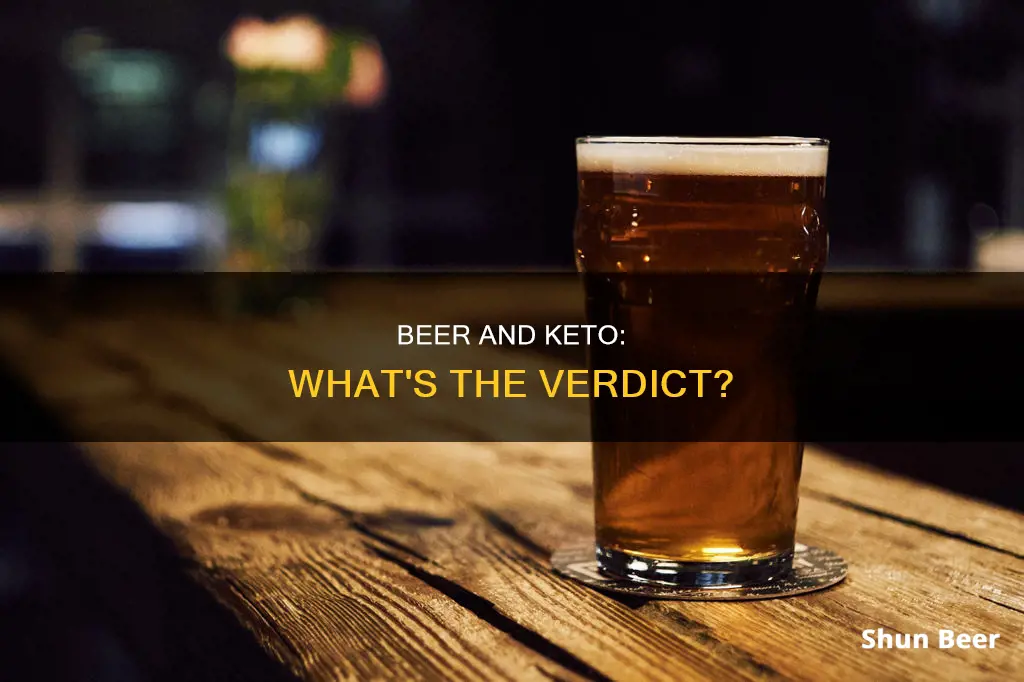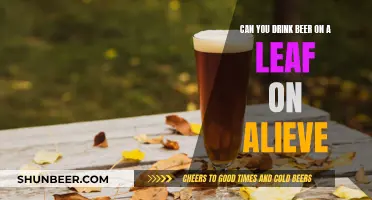
The ketogenic diet is a low-carb, high-fat diet that has gained popularity in recent years for its potential weight loss benefits. While on the keto diet, it is important to carefully plan meals to stick to your daily carb allotment and keep your body in ketosis, a state where you burn fat for fuel instead of carbohydrates. This often means giving up high-carb indulgences like sweets, snacks, soft drinks, and alcohol.
However, this does not necessarily mean that you need to give up alcohol entirely. Alcoholic drinks with fewer carbs can help you stay within your daily limits. For example, pure forms of alcohol like whiskey, gin, tequila, rum, and vodka are free of carbs, and wine and light beer are relatively low in carbs, usually containing under 6 grams per serving.
If you are following the keto diet, it is important to be mindful of your alcohol consumption and choose low-carb options.
| Characteristics | Values |
|---|---|
| Carbohydrates | 20-50g per day |
| Alcohol | One drink per day for women and two per day for men |
| Beer | Choose light beers to stay within the daily limit |
| Spirits | Carb-free |
| Mixers | Club soda, sparkling water, diet soda, seltzer, diet tonic water, and powdered flavour packets |
| High-carb drinks to avoid | Cocktails, mixed drinks, regular beer, tonic water, regular soda |
What You'll Learn

Low-carb beers
While on the keto diet, you may be able to enjoy the occasional beer, as long as it's low-carb. The ketogenic (keto) diet is a low-carb, high-fat diet that many adopt to lose weight and improve their health. Typically, keto diets restrict carbs to 20 to 57 grams a day. A standard beer contains 14 carbs, so low-carb beers are a good alternative.
There are several ways to make light beers, which are often low-calorie and low-carb. One common method involves introducing certain enzymes into the mash or fermenting beer until most of its carbohydrates are broken down into simple sugars before diluting the mixture with water. This cuts down both the total ABV and calories.
Examples of low-carb beers
- Miller Lite contains 96 calories and 3.2 carbs (12 US Fl.oz) per serving. It's also sugar-free.
- Budweiser Select 55 is a golden lager with only 55 calories and 1.8g of carbs.
- Michelob ULTRA has 95 calories per serving and 2.6 carbs.
- Coors Light has a low ABV and 5.0 carbs, with 102 calories.
- Heineken Light has 99 calories and 7 grams of carbs.
- Corona Light has 99 calories and 5 grams of carbs.
- Miller 64 Extra Light Lager has 64 calories and 2.4 grams of carbs.
- Corona Premier has 90 calories, 2.6 grams of carbs, and 4% ABV.
- Beck's Premier Light has 64 calories and 3.9 grams of carbs.
- Amstel Light has 95 calories, 5 grams of carbs, and 3.5% ABV.
- Michelob Ultra Pure Gold has 85 calories, 2.5 grams of carbs, and 3.8% ABV.
Exploring the Limits: 50 IPAs, a Safe Challenge?
You may want to see also

Alcohol's impact on ketosis
The keto diet is a low-carb, high-fat diet that aims to induce ketosis, a state where the body burns fat for energy instead of carbohydrates. Alcoholic beverages typically contain carbohydrates, and choosing those with fewer carbs is crucial for staying within the keto diet's daily limits.
Beer, cocktails, and drinks with added sugar tend to have high carb content, making them less suitable for the keto diet. However, some light beers and low-carb options are available, such as Miller Lite, Budweiser Select 55, and Michelob ULTRA, which can be consumed occasionally without disrupting ketosis.
Spirits like gin, vodka, rum, tequila, and whiskey are carb-free, but it is important to choose low-calorie mixers like soda water or flavoured sparkling water. Wine and champagne are also lower-carb options, with dry wines having the lowest sugar content.
While these keto-friendly alcoholic drinks can be consumed in moderation, it is important to remember that alcohol provides empty calories and can affect decision-making, potentially leading to choices that contradict the keto diet. Additionally, the body may prioritise using energy from alcohol over ketones from body fat, which could limit the diet's effectiveness. Therefore, while alcohol can be consumed on the keto diet, it should be done strategically and in moderation.
Beer and Urine: Is Pale Pee Beer-Related?
You may want to see also

Alcohol-free alternatives
Alcohol-free beers are often higher in carbs and sugar, which can be problematic for those on a keto diet. However, there are some lower-carb options available. For example, Drop Bear Brewing's "Yuzu Pale Ale" has just 0.4g of carbs per 100ml, while Bitburger "Drive" (0%) lager contains only trace amounts of sugar.
- Beck's "Blue" (0.05%) lager
- Heineken “0.0” (0.05%) pale lager
- Bitburger "Drive Alcohol-Free" (0%)
- Budweiser Budvar “B:Free” (0.5%) pale lager
- Nirvana Brewery “Karma” (0.5%) pale ale
- Budweiser "Zero" (0%) lager
- Corona "Cero" (0%) lager
- Guinness "0.0" (0%) dry stout
- Heineken "0.0" (0%)
- Bitburger "Drive" (0%)
- Beck's Blue Alcohol-Free Beer
- Budweiser Prohibition Brew Non-Alcoholic Beer
- Coors Non-Alcoholic Beer
It's important to note that even "low-alcohol" beers can contain up to 0.5% alcohol by volume, so if you're strictly avoiding alcohol, be sure to choose a beer that is completely alcohol-free. Additionally, remember to consume these drinks in moderation as part of a balanced diet.
Beer and Painkillers: Mixing Tylenol and Alcohol
You may want to see also

Best mixers for keto
While on the keto diet, it's important to watch what you mix with your alcoholic drinks. Many mixers contain carbs, which can quickly turn a carb-free drink into a high-calorie drink. Here are some of the best mixers to use while on the keto diet:
- Diet soda — Using diet soda as a mixer can help keep the carb content of your drink to a minimum.
- Seltzer — Carbonated water, like seltzer, is a great low-carb option for mixing drinks.
- Diet tonic water — Tonic water is another good mixer, but be sure to choose the diet version to avoid extra carbs and calories.
- Powdered flavour packets — These can add flavour to your drink without adding carbs.
- Club soda — Like seltzer, club soda is a type of carbonated water that can be used as a mixer without adding carbs.
- Sparkling water — Sparkling water can add some fizz to your drink without the carbs.
- Low-carb simple syrup — Making your own simple syrup with a low-carb sweetener can be a great way to add sweetness to your drinks without the carbs.
- Diet ginger beer — Ginger beer can add a spicy kick to your drink, but be sure to choose the diet version to keep the carb count low.
- Sugar-free or unsweetened juice — While juice is typically high in carbs, you can find sugar-free or unsweetened versions that can be used as mixers.
Remember, even when using these low-carb mixers, it's important to drink in moderation. Alcoholic beverages, even low-carb ones, are still rich in "empty" calories and can contribute to weight gain and nutritional deficiencies over time.
Beer and Tylenol: Safe After a Few Hours?
You may want to see also

Health considerations
The ketogenic (keto) diet is a low-carb, high-fat diet that many people adopt to lose weight and improve their health. It is a popular weight loss option, and some research claims that it can also help reduce cancer risks, improve heart health, and protect brain function. However, it is important to note that more studies are needed to verify these potential benefits.
When following the keto diet, it is crucial to carefully plan your meals to stick to your daily carb allotment and keep your body in ketosis. This may mean giving up sweets, snacks, and other high-carb indulgences like soft drinks and alcohol. However, some alcoholic beverages are low in carbs and can be enjoyed in moderation while on the keto diet.
Beer, a popular alcoholic beverage, typically contains many carbs and is not considered keto-friendly. However, some light beers have very low carbs, making them a better option for those on the keto diet. These include Coors Light Lager Beer, Miller Lite, and Budweiser Select 55.
It is important to note that the keto diet requires strong determination and self-control to maintain the daily carb limit. Alcohol can impair judgment and lead to consuming foods or drinks that are not keto-friendly. Additionally, the body may use energy from alcohol before using ketones from body fat, potentially limiting the diet's effectiveness.
For those following the keto diet to treat a medical condition, such as diabetes or epilepsy, it is recommended to avoid alcohol altogether. Consuming alcohol on keto can directly and indirectly affect weight loss by slowing down the rate of ketosis and increasing weight gain. Alcohol suppresses fat burning and increases the storage of extra calories as fat tissues.
Excessive alcohol consumption is linked to various adverse health effects, including liver problems, cancer, and heart disease. Therefore, it is important to keep alcohol intake moderate, defined as one drink per day for women and two per day for men.
While it is possible to find low-carb beer options while on the keto diet, it is crucial to consume them in moderation and be mindful of their potential impact on weight loss and overall health.
PRP Recovery: Can You Drink Beer Post-Procedure?
You may want to see also
Frequently asked questions
Yes, you can, but it's not recommended. Alcohol can slow down your weight loss progress. If you do decide to drink, opt for low-carb beers.
Alcohol can slow down your weight loss progress as it can be converted into ketones, which your body will prioritise over fat. Alcohol also affects your judgment and willpower, which may lead to poor food choices.
Some low-carb beers include Miller Lite, Budweiser Select 55, Michelob ULTRA, Coors Light, Heineken Light, Corona Light, Omission Light, and Devil's Backbone Bright Tangerine Sparkling Ale.
It's recommended to limit your consumption to one drink per day for women and two drinks per day for men. Drinking more than this can slow down the fat-burning process.
Yes, spirits such as gin, whiskey, rum, and vodka contain no carbs. Wine and champagne are also relatively low in carbs. When mixing drinks, opt for low-carb mixers like soda water, flavoured sparkling water, or diet soda.







